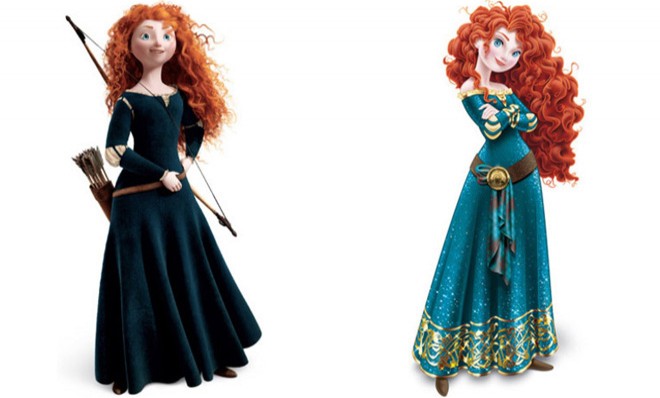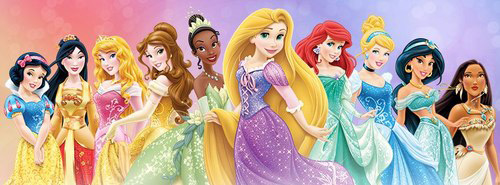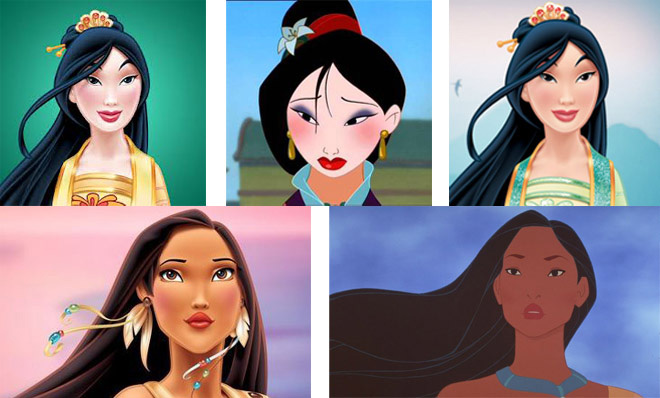Girls on Film: The real problem with the Disney Princess brand
The company's wildly profitable Disney Princess line sends a dangerous and regressive message to young girls. It's not too late to fix it.


A free daily email with the biggest news stories of the day – and the best features from TheWeek.com
You are now subscribed
Your newsletter sign-up was successful
Disney built its massive Princess empire — which now stretches from 1937's Snow White to 2012's Merida — by sanitizing the stories of the past. From Snow White to The Frog Prince, Disney excised fairy tales of their inherent horror — the rampant cannibalism, torture, and bloody mayhem characteristic of most traditional stories — in favor of a blanket policy of "happily ever after." The literary darkness was cleansed, but despite the company's best efforts, a social darkness has remained.
Disney has a sad history of gross racial stereotypes (from Dumbo's crows to Aladdin's ear-cutting barbarians) and highly problematic female characterizations and storylines (from Snow White's servitude to the Little Mermaid giving up her voice for love). The company's latest in a long string of controversies came last week with the news that Merida, the heroine at the heart of last year's Brave, was becoming a certified Disney Princess.
Last weekend, the fiery Scottish lass from the film received an official coronation at the Magic Kingdom — not as the rebellious girl introduced in Brave, but as a sparkling, made-over princess. Disney's redesign of the character tamed her unruly hair, expanded her breasts, shrank her waist, enlarged her eyes, plastered on makeup, pulled her (now-glittering) dress off her shoulders, and morphed her defiant posture into a come-hither pose. The bow-wielding Merida of Brave — a character who explicitly fought against the princess world her mother tried to push her into in the film — was becoming what she hated, and inadvertently revealing the enormously problematic nature of Disney's Princess line.
The Week
Escape your echo chamber. Get the facts behind the news, plus analysis from multiple perspectives.

Sign up for The Week's Free Newsletters
From our morning news briefing to a weekly Good News Newsletter, get the best of The Week delivered directly to your inbox.
From our morning news briefing to a weekly Good News Newsletter, get the best of The Week delivered directly to your inbox.
Let’s rewind. Disney began its empire with three princesses, Snow White, Cinderella, and Aurora, the Sleeping Beauty. Then, when Aurora woke from her slumber in the 1959 film, Disney began a slumber of its own: Three decades passed until Disney used a princess as a main character again, in 1989's The Little Mermaid. At first, the princess revival hinged on the same, tired narrative: The hunt for a prince, which required a young woman to give up her own voice and passions for the love of a man. But the arrival of Aladdin in 1992 showed that Disney's princess world could actually expand. There were still a number of problematic aspects in each film, but Disney's scope began to stretch beyond the lily-white princesses of its earlier films: Aladdin, Pocahontas, and Mulan brought new visions of what a "Disney Princess" could be, with the latter even stretching the barriers to show that Mulan — a princess in principle, if not in title — could also be a fierce warrior.
The evolution of Disney's princesses was stymied by the arrival of the Disney Princess line in the late 1990s. The Disney Princess franchise doesn't celebrate the increasingly diverse world of princesses; instead, it pulls back the progress the company had made, pushing the more forward-thinking female characters back into the reductive feminine stereotypes of the past.

Author Peggy Orenstein — the force behind the initial backlash to Merida's coronation — revealed the impact of "princess culture" on young women with her 2006 New York Times article "What's Wrong With Cinderella?" and subsequent book, 2011's Cinderella Ate My Daughter: Dispatches From the Front Lines of the New Girlie-Girl Culture. As a mother, Orenstein wrote about how excessive repetition of Princess products, which encompassed everything from pens to Band-Aids, had a significant effect on her daughter. It even informed how adults interacted with her child, offering "princess pancakes," pink balloons, and even a "princess chair" at the dentist's office.
Orenstein's experiences revealed not only the reductive world of pastel pink princesses, but also the growing struggle for mothers to create worlds of diverse opportunity for their daughters. Orenstein's own daughter read her distaste for what Cinderella represented as hatred for a woman: "There's that princess you don't like, Mama!… Don't you like her blue dress, Mama?… Then don't you like her face?"
A free daily email with the biggest news stories of the day – and the best features from TheWeek.com
Psychotherapist Mary Finucane, meanwhile, struggled with her daughter's even darker concerns. "She began refusing to do or wear things that princesses didn't do or wear," Finucane said of her 3-year-old daughter. "She had stopped running and jumping because princesses didn't do those things. That was about the time I stopped waiting for the phase to pass — when she stopped running." As Orenstein explains, princess culture was no longer just about fairy tale magic, but "a constant narrowing of what it means to be feminine."
Last year, Brave's Merida arrived as a character specifically designed to combat Disney's increasingly reductive princess archetype. In a petition drafted to fight Merida's redesign, A Mighty Girl founder Carolyn Danckaert includes Brave creator Brenda Chapman's inspiration for the film:
Because of marketing, little girls gravitate toward princess products, so my goal was to offer up a different kind of princess — a stronger princess that both mothers and daughters could relate to, so mothers wouldn't be pulling their hair out when their little girls were trying to dress or act like this princess. Instead they'd be like, 'Yeah, you go girl!'
Instead of celebrating the fiery spirit that made Brave the eighth top-grossing film of 2012, however, Disney chose to do the opposite, making her into exactly what Chapman (and Merida) were fighting against and ignoring Disney's own promotional video about "What it truly means to be a Princess."
Unfortunately, Merida isn't the only victim. Virtually every Disney princess has received a redesign that makes her look more like the others: Narrower jaws, larger eyes, smaller noses, and waists narrowed so drastically that the characters look as if Disney has marched them into a plastic surgeon's office for liposuction and rib removal. The characters of color have it even worse, with their features audaciously whitewashed: Mulan changes from a young Chinese woman into a girl with white, ruddy skin and plump lips; Pocahontas, meanwhile, gets lighter skin, chin implants, larger eyes and lips, and a much smaller nose. (Jasmine's makeover is more subdued — but like Mulan and Pocahontas, her skin lightens with every updated look.)

These redesigns are in conflict with the films, which show Mulan hating the matchmaking makeup put on her, or Merida violently tugging at the oppressive fashions she has to wear. The redesigns come after the films — which means that the ultimate message is that these characters have found happiness in this restrictive femininity, as the nonstop Disney marketing that young children are subjected to on a daily basis begins to act as a real-world sequel to the films themselves.
Fortunately — though without taking any responsibility — Disney has started to quietly backtrack on some of these changes. Mulan's skin was darkened a touch on her official webpage (although it's still a far cry from the "reflection" video from the original film that's viewable just underneath her introduction), and Merida's 2D redesign was not included on her official Princess webpage at all.
After a week of silence, Disney finally responded to criticism at Disney-themed website Inside the Magic on Wednesday. In a statement, Disney Consumer Products says the controversy has been "blown out of proportion," since Merida's new look wasn't an official redesign, but a "one-time stylized version" to fit the specific needs of the coronation. (DCP goes as far as saying that Merida herself wanted to "dress up" for the coronation — conveniently ignoring that Brave specifically emphasized her distaste for that sort of thing.)
The company claims that the image used on the invitation is only the "official" version used for the ceremony, and not any other image circulating on the web. Unfortunately, even that limited qualification proves inaccurate. In the same statement, DCP admits there are other variations of Merida's coronation redesign being used for various retail stores, and the article includes a picture of a T-shirt emblazoned with the new version of the character.
As always, Disney is testing the limits of its consumers, with the pitch and ferocity of public unrest serving as the sole compass guiding the company's decisions. The Merida controversy mimics the arrival of The Princess and the Frog a few years ago. Before the film starred Tiana, the budding restaurantress of the final cut, it was supposed to be about Maddy, a chambermaid working for a rich white family, until backlash led to creative tweaks. When Disney Television's Princess Sofia was introduced as a Latina last year by the executive producer, the company backtracked, linking her ethnicity to a fictional kingdom to dodge growing questions about the young princess. Earlier this month, Disney actually planned to trademark the holiday Dia de los Muertos for an upcoming Pixar film, until protests made them change course.
But regardless of Disney's characteristic backpedaling, there are many who wish for the world of Disney Princesses to die altogether. That's an unrealistic goal in this market; as Orenstein once wrote: "'Princess,' as some Disney execs call it, is not only the fastest-growing brand the company has ever created; they say it is on its way to becoming the largest girls' franchise on the planet." Fortunately, there's no reason this behemoth of a brand can't learn the same lesson Disney's film division is slowly learning: That stories for young girls and boys alike can thrive by depicting young women who are interested in more than princes and pretty dresses. Many hate the term "princess" for what the brand currently represents: One very narrow version of femininity that has a significant impact on its young consumers' visions of themselves. But it's well within Disney's power to continue its successful brand while reflecting the lessons and diversity the films offer.
Creatives like Brave's Brenda Chapman have given Disney the opportunity to make "princess" a term encompassing many different embodiments of young women that live all kinds of "happy endings." Brave's young protagonist is a young princess who hates being forced to dress up and act regal. She just wants to shoot her bow and arrow and be brave like her dad — and ultimately, her happiness has nothing to do with finding a prince. (Some have chastised Disney for turning her into a princess, but let's not forget: She already was one!)
The truth is that, just as there are all kinds of women, there can be all kinds of princesses. We live in a world where even Barbie was an executive, astronaut, and surgeon in her early days, and can now be anything from a military officer to a race car driver to a computer engineer. So far, no matter how many adventures they've had on screen, the Disney Princess line has taken its characters and whittled them into uniform fembots. There's nothing brave about that — but it's not too late for Disney to accept its responsibility as a creator of family-friendly products and work not to narrow the worldview of young girls, but to expand it.
Editor's note: This article originally incorrectly identified the person who started the petition against Disney's Merida redesign. The petition was actually started by A Mighty Girl founder Carolyn Danckaert. We regret the error.
Girls on Film is a weekly column focusing on women and cinema. It can be found at TheWeek.com every Friday morning. And be sure to follow the Girls on Film Twitter feed for additional femme-con.
Monika Bartyzel is a freelance writer and creator of Girls on Film, a weekly look at femme-centric film news and concerns, now appearing at TheWeek.com. Her work has been published on sites including The Atlantic, Movies.com, Moviefone, Collider, and the now-defunct Cinematical, where she was a lead writer and assignment editor.
-
 El Paso airspace closure tied to FAA-Pentagon standoff
El Paso airspace closure tied to FAA-Pentagon standoffSpeed Read The closure in the Texas border city stemmed from disagreements between the Federal Aviation Administration and Pentagon officials over drone-related tests
-
 Political cartoons for February 12
Political cartoons for February 12Cartoons Thursday's political cartoons include a Pam Bondi performance, Ghislaine Maxwell on tour, and ICE detention facilities
-
 Arcadia: Tom Stoppard’s ‘masterpiece’ makes a ‘triumphant’ return
Arcadia: Tom Stoppard’s ‘masterpiece’ makes a ‘triumphant’ returnThe Week Recommends Carrie Cracknell’s revival at the Old Vic ‘grips like a thriller’
